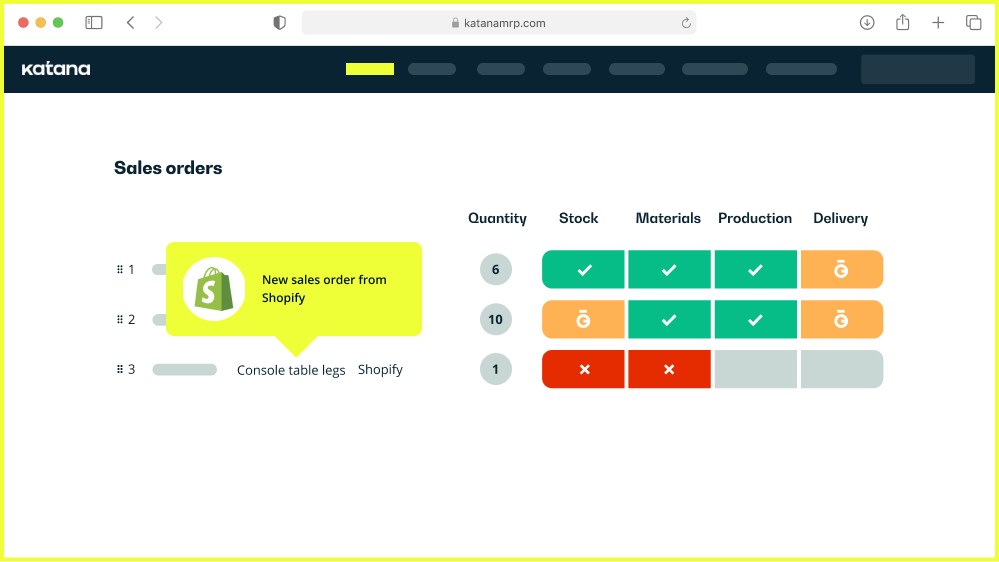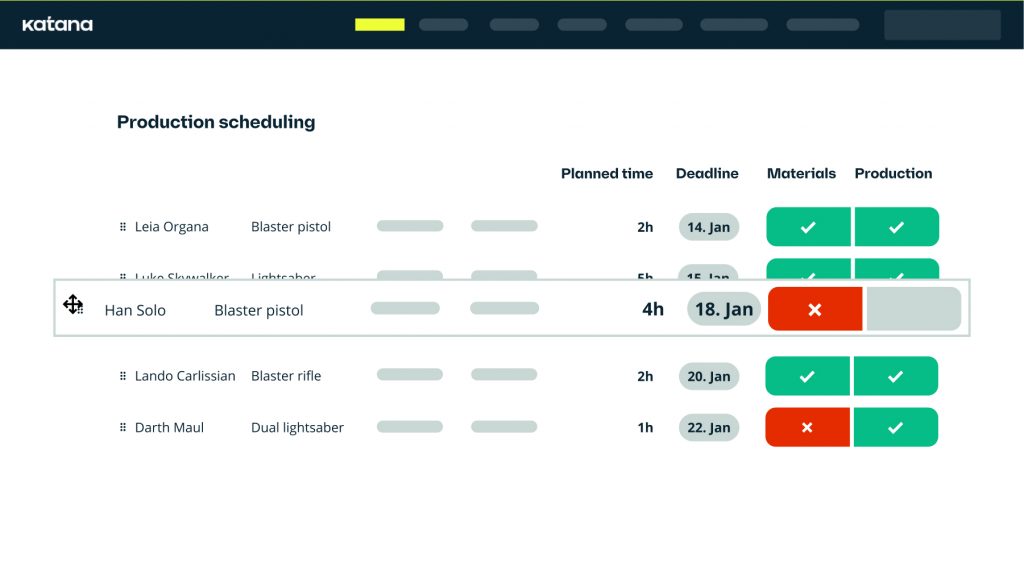10 benefits to omnichannel order management
If you want to successfully leverage your brand across different sales channels, you’re going to need to consider adopting an omnichannel order management strategy to help you carry out this task.

James Humphreys
If you’re a business owner searching for advice online, you have likely come across this term — leverage.
Leverage is all about your business getting exposure across different sales channels and platforms. If you’ve ever read about building a successful brand experience, leverage will have been thrown around in that article. But, if the left hand doesn’t know what the right hand is doing, leveraging your sales will be an uphill battle.
We’re here to tell you that you can diversify your sales channels while maintaining cohesion between them.
Introducing omnichannel order management.
What is omnichannel order management?

Omnichannel order management is a modern solution for managing inventory and orders by seamlessly integrating all of your sales channels.
It allows you to provide a consistent, convenient experience for your customers no matter how they choose to shop. With an omnichannel system in place, you can easily keep track of inventory levels and ensure that omnichannel fulfillment is done promptly and correctly, even if a customer engages with multiple channels. This can help improve customer satisfaction and loyalty, as well as boost your bottom line.
If you’re considering implementing a comprehensive and centralized sales strategy for your business, an omnichannel solution may be right for you.
How does omnichannel order management work?

Implementing an omnichannel order management system requires a single view of customers, their order history, and inventory levels across all channels. Omnichannel order management allows sellers to manage customer orders across all sales channels.
This means sales channels such as:
- Website
- Shopping app
- Social media
- Mobile
- Call center
- Brick-and-mortar shops
A centralized view of all sales channels, orders, and customers helps ensure that buyers always get the products they want, when and where they want them. Omnichannel retailer order management can be a challenge, but it’s essential for providing the best possible shopping experience. With the right omnichannel strategy in place, businesses can provide their customers with convenience and a buyer-centric experience.
Benefits of omnichannel order management
Consumer expectations show that they want a seamless experience regardless of how they choose to shop along their buying journey.
This has created challenges for businesses and omnichannel retailers alike, who must manage inventory and orders across all channels. Adopting an omnichannel order management system will improve your reputation with customers. Additionally, omnichannel order management can help you improve operational efficiency and reduce costs.
Here are 10 key benefits of omnichannel order management for your business.
1. Improved customer experience
Omnichannel order management can help businesses provide a seamless shopping experience for their customers by managing orders and inventory across all sales channels.
There are many reasons why improved customer experience is important. Satisfied customers are more likely to buy from a company again and recommend it to others. Good customer service can also result in lower acquisition costs, as happy customers are less likely to take their business elsewhere.
Finally, improved customer experience can simply make your customers feel good — and that’s always worth striving for.
2. Optimized operational efficiency
Omnichannel order management can help businesses improve operational efficiency by reducing the need to reconcile inventory and orders across multiple channels manually.
Operational efficiency is important for any business because it directly impacts the bottom line. Streamlining operations and reducing waste helps companies save money and increase profits while decreasing the amount of manual work needed in daily tasks. In addition, improved operational efficiency can help a company compete more effectively in the marketplace by reducing costs and increasing productivity.
Ultimately, operational efficiency is essential for any business that wants to succeed.
3. Reduced costs
Firstly, if you want to enter a new market, you don’t have to open a new store at a location — creating a website and selling from your current premises gives you the freedom to work from the comfort of your own home.
Then comes the less tangible forms of reduced costs. By implementing an omnichannel selling strategy, you will eliminate middlemen or third-party services and keep everything in-house. The other savings come with improving customer retention and having all your customers’ data centralized.
Pro tip: If you wish to learn more about product accounting, feel free to check out these articles:
4. Increased sales
By providing a better customer experience and improving operational efficiency, omnichannel order management can help businesses increase their sales.
Sales are the lifeblood of any business. Without sales, a business simply cannot survive. This is why increasing sales numbers is so important to businesses of all sizes.
First and foremost, more sales mean improved revenue.
This is vital for any business, as it allows them to reinvest in the company, expand operations, and hire new staff. Increased sales can also lead to improved brand experience recognition and awareness. When customers see that a business is selling more products or services, they are likely to view it more favorably and also recommend it to others.
Ultimately, increased sales represent growth, and that’s essential for any business that wants to succeed in the long term.
By increasing their sales, businesses can ensure their continued success and longevity, and there are a number of ways to do that.
- Create a strong marketing strategy for your business — This will ensure that potential customers are aware of your brand and know what makes your goods and services unique
- Focus on providing excellent customer service — When customers have a positive experience with your business, they are much more likely to return in the future and recommend you to others
- Always look for new ways to reach potential customers — Keep looking and investing in more sales channels to reach a wider audience
Whether it’s through online marketing or traditional methods like print ads or word-of-mouth, make sure you’re doing everything you can to get your business in front of as many people as possible.
5. Improved customer retention
By providing a better customer experience, omnichannel order management can help businesses improve customer retention.
When buyers stick around, they tend to spend more money over time. In addition, satisfied customers are also more likely to refer others to your business, which can help you attract new buyers. Happy customers also tend to be more loyal and less likely to switch to a competitor.
There are many ways to improve customer retention.
- Providing exceptional service — People will remember their encounter with your business, and if it was a good one, they’ll be sure to recommend their friends to use your services as well. On the other hand, a negative experience will also be talked about, so try to avoid those
- Offering competitive pricing — Most buyers are guided by their wallets, and customer-friendly prices will make buyers more inclined to return to you for their shopping
- Regularly communicating with clients — Make sure that your customers don’t forget about you and stay connected to your brand. This can be achieved by sending out regular newsletters, asking for feedback on their purchase, or offering discounts to returning customers
By taking well-planned steps to improve customer retention, you can boost your bottom line and build a stronger, more loyal customer base.
6. Improved supply chain management
Omnichannel order management can help businesses improve supply chain management by providing visibility into inventory and orders across all channels.
Supply chain management (SCM) is critical to businesses today. An efficient and effective SCM system can help organizations improve their overall performance and competitiveness.
By utilizing an omnichannel solution in your supply chain, you can handle the management of materials, supplies, and goods for all your locations and sales channels. This allows you to plan ahead for restocking across your warehouses, giving you the flexibility and transparency needed to stay ahead of possible delays or supply chain disruptions.
Many software solutions are advanced enough to work with your strategies, automate operations, and do it all while promoting a sustainable supply chain.
Pro tip: Most omnichannel order management seekers are active in online sales channels and do most of their business in e-commerce. Make sure to check out our article on e-commerce fulfillment to find the best practices, learn from industry leaders, and figure out the best solution for your business.
7. Increased visibility
An omnichannel order management strategy can help sellers make better decisions about safety stock levels and promotions by providing visibility into inventory and orders across all channels.
When businesses use multiple channels to sell their products or services, they are more likely to be seen by potential customers. By being presented on various platforms, companies can increase their chances of being found by customers looking for what they have to offer. Each sales channel tends to have its own target audience, and limiting your operations to just one also limits your visibility to potential customers.
However, the more sales channels you have, the more complex your inventory and order management will become, which is why an omnichannel solution is essential to simplifying daily operations.
8. Improved data quality
By providing visibility into inventory and orders across all channels, omnichannel order management can help businesses improve data quality. This improved data quality can lead to better decision-making about stock levels and promotions.
There are several reasons why improved data quality is important.
- Accurate and reliable data is essential for making good business decisions
- High-quality data can help organizations improve their operational efficiency and performance
- Good data can help companies develop more effective marketing strategies and target their advertising efforts better
Ultimately, improving data quality can benefit businesses of all sizes.
9. Reduced risk
An omnichannel order management strategy can help businesses reduce risks by improving data quality and real-time inventory visibility.
One of the biggest risks associated with selling online is the potential for fraud. By using an omnichannel approach, businesses can mitigate this risk by having multiple contact points with their customers. This way, if there is any suspicious activity, it can be quickly identified and addressed.
Another risk associated with selling online is the possibility of losing customer data.
When customers purchase products or services online, they typically input their personal information, such as their name, address, and credit card number. If this information is not properly secured, it could be accessed by unauthorized individuals. However, if businesses use an omnichannel approach, they can store inventory data in multiple locations, making it more difficult to steal or lose.
10. Better decision making
A key omnichannel order management benefit is improved data quality and visibility, which helps businesses make better decisions about stock levels and promotions.
Decision-making is an important part of any business, and the ability to make better decisions can mean the difference between success and failure. Several factors go into making a good decision, and understanding these factors can help you make better choices across your operations.
Is omnichannel something your business needs for success?

The short answer is yes. That is if you’re actively selling in multiple channels.
There’s no doubt that customers today are more connected than ever before. They move seamlessly between online and offline channels, often using multiple devices to research and purchase products or services. As a result, businesses need to adopt an omnichannel marketing approach to keep up.
Omnichannel marketing provides a seamless experience for customers, no matter how they choose to engage with your brand. This means consistent messaging and branding across all channels to make it easy for customers to move between them.
However, it’s important to note that not all businesses will need to adopt an omnichannel approach. In some cases, a single-channel approach may be sufficient.
If you’re not sure whether an omnichannel strategy is right for your business, consider the following factors.
- Do your customers move between online and offline channels? If yes, an omnichannel solution is likely necessary to reach them effectively and stay on their minds.
- Are your products or services complex and require extensive research before purchase? An omnichannel marketing approach will help provide customers with information while they familiarize themselves with your products to feel comfortable using them.
- Are your competitors using an omnichannel system? If so, you may need to as well, just to stay competitive.
Ultimately, only you can decide whether an omnichannel approach is right for your business. However, if you’re looking to reach more customers and provide a better experience, it’s worth considering.
Omnichannel order management for retailers

Omnichannel retail management is not a new concept, but it has become more important in recent years as shoppers have become more comfortable shopping online and using mobile devices.
To compete with pure-play online retailers, brick-and-mortar need as stress-free store fulfillment as their online counterparts.
The benefit of an omnichannel strategy is evident for both retail businesses and shoppers. For retailers, it can help to increase sales, inventory visibility, and customer loyalty. For shoppers, it provides a more convenient and seamless shopping experience.
However, retailers’ order management for the omnichannel approach is not without its challenges.
It can be difficult and expensive for retailers to implement, and it requires a high level of coordination between various departments within the company.
Despite the challenges, omnichannel retail is something that many retailers are striving for. To stay competitive in today’s market, brick-and-mortar stores need to find ways to offer a similar level of convenience and customer service as their online counterparts.
PRO TIP: As a quick summary, here is a list of benefits businesses and omnichannel retailers can enjoy if they implement the strategy correctly:
- Faster deliveries to your fulfillment locations and fulfillment centers
- Improved delivery times of items
- A better understanding of inventory availability
- A better understanding of product availability
- A clearer understanding of the shopping journey of customers
- Quicker and more efficient shipping and returns procedures
- Unified commerce — leverage
- A better understanding of customers’ preferences
Omnichannel order management for manufacturers

Many manufacturing businesses choose to distribute and sell their own goods, which adds another layer of complexity to their omnichannel order management.
This means tracking inventory back to the raw material or component stage, monitoring a product’s entire lifecycle, and following it through the production stages before it even hits the stores. Starting from manufacturing gives businesses the flexibility to change their processes faster, as they have live insights into product popularity and customer trends and can quickly react to delays and obstacles.
While a large part of omnichannel order management is similar for both manufacturers and resellers, there are a few specifics that manufacturers should keep in mind.
Supply chain management
As mentioned, for manufacturers, the supply chain doesn’t start with the procurement of goods but with getting the necessary supplies for production. This requires an elaborate system that centralizes raw material, work-in-process, and finished goods inventory management.
Also, potentially having multiple suppliers creates a need to gather all the data on one platform where it’s accessible and visible to all required participants. It allows for more open communications, enables faster responses to changes, and empowers transparency across teams.
Regulations and standards
Some products have special requirements for preservation and shipment.
Imagine having a whole business that produces dairy-free ice cream and transporting it in a regular van in good old cardboard boxes. At the end of the day, it’s your brand that’s damaged when customers aren’t satisfied with their product.
That’s why many manufacturers prefer to sell and transport their goods on their own terms. In plenty of industries, the storage and transportation requirements are extremely specific and need to follow international standards.
Examples
The most common industries that are known for their strict regulations include:
Scalability
As sales numbers grow, so will the production level, and your omnichannel order management strategy needs to keep up.
Being flexible in your production, inventory, and sales management, in turn, allows you to expand your operations across new channels and geographic locations or even try out new products. Flexibility also means keeping up with customer trends and adapting to market changes promptly.
Production planning
The biggest difference in omnichannel order management for manufacturers is obviously the whole production side. It involves multiple aspects of business that all should be considered in the production process.
- Planning and forecasting — Having immediate access to accurate data about sales gives manufacturers the necessary insight into which products are popular, what customers prefer, and how to plan their future operations
- Order prioritization — Knowing the customers’ preferences allows production to focus on the most profitable goods and categories, this is also known as the 80/20 inventory rule
- Quality control — Customers associate their products with the manufacturer, not the reseller, so for brand reputation, it’s crucial to ensure the best possible quality in your products
- Customization — Various sales channels attract different markets and target audiences, which could mean anything from personalized goods to custom packaging
Having a solution that brings together production management, inventory, and sales is essential for effective and smooth workflows. This means adopting software that either offers all these features or allows the integration of multiple solutions into one platform.
Katana Cloud Inventory Platform
Thousands of businesses are using Katana to get a real-time view of all their sales channels and manage their omnichannel strategy.
Katana omnichannel order management system

Katana is an all-in-one platform that empowers businesses to control their entire operations, from sales to production and inventory management.
If you’re in a retail or manufacturing business, you understand the challenges of managing all its different aspects. Katana allows users to automate their day-to-day activities and gain access to live data, all of which can be used to make better business decisions on the fly. Katana also comes equipped with essential features for an omnichannel order management strategy.
Multichannel inventory management
Katana gives users complete inventory visibility across all their sales channels — ensuring they never miss a deadline again.
Regardless of where your stock is located, Katana helps you keep track of inventory movement in real-time, so you know exactly what you have on hand, what’s committed, and when raw materials are due to arrive. Implement barcode inventory management to optimize and streamline receiving and counting stock. Katana also integrates with e-commerce platforms, so you can centralize inventory management and execute your omnichannel strategy, for example:
- Shopify order management system
- WooCommerce inventory management plugin
- BigCommerce inventory management
- And more integrations, connected natively, third-party, or via the Katana API

Inventory management guide
Download a comprehensive ebook with everything you need to know about inventory management.
Order management solutions
From purchase order management to managing manufacturing and sales orders — Katana centralizes your order management on one easy-to-understand platform.
Katana, as an omnichannel order management solution, allows you to see the status of all orders from one screen. This enables tracking purchases and data of customers, regardless of the sales channels they use. Having all this information a button away can improve customer experience and helps handle returns or client queries across different channels.
Digitalized picking and packing
Minimize your paperwork with barcode scanning on your shop floor for easier and cleaner picking and packing tasks.
Omnichannel order management features such as barcode scanning will make finding and identifying your item variants more efficient. You can use different types of barcodes to track items anywhere in your supply chain or business. You can use Katana’s barcode features for:
- Performing stocktakes during audits
- Receiving deliveries
- Generating your own barcodes for internal use
- Managing raw material inventory on the shop floor
- Assigning batch numbers to items
And there you have it — everything you need to understand about omnichannel order management and how to implement the strategy into your business.
If you’re interested in joining forces with Katana to take your processes to the next level, talk with us by booking a demo. See firsthand why thousands of businesses entrust Katana with their business and operations management.
Until then, check out a short tour of how Katana works and what it can do.
Omnichannel order management FAQ
Omnichannel order management is a strategy for managing inventory and orders by seamlessly integrating all of your sales channels.
It’s used to gain a better overview of all sales, order, and customer data, allowing businesses to improve their processes, develop better marketing strategies, and enhance customer experience. Omnichannel means “all channels,” aiming to gather all your sales channels into one system or platform.
An omnichannel approach is mostly used by retailers who promote their products on multiple websites, online stores, or apps. Manufacturers also often choose an omnichannel strategy to easily monitor all their suppliers, distributors, and clients.
An omnichannel order management system gathers data from all your sales channels, creating one central platform where you have access to every aspect of your retail business.
The most common sales channels include:
- Websites
- Shopping apps
- Social media
- Email marketing and sales
- Mobile
- Call center
- Brick-and-mortar shops
Omnichannel order management solutions allow you to monitor each of those channels separately as well as one big ecosystem. They help you manage inventory, orders, returns, and data automatically, minimizing the risk of manual errors and oversights.
Omnichannel management for B2B differs only in that instead of selling to single customers, you now sell to another business.
Clients are usually referred to as accounts, and sales volumes tend to be larger than for private clients. This means more payment methods, like credit terms and purchase orders, and multiple shipping options, including pick-up, express delivery, and bulk shipments.
Business clients tend to be more specific and decisive in their wishes and B2B sales are often done via self-service tools. These portals give customers a better overview of their orders, invoices, and accounts. Self-service helps streamline the buying process and allows orders to be placed 24/7.
Wholesale e-commerce for B2B often also comes with personalized customer service. This means assigning a dedicated account manager to each client, who is familiar with the buyer’s needs and can offer assistance and support based on their unique requirements.
In a supply chain, omnichannel refers to a strategy that goes beyond sales and considers all distribution channels and fulfillment centers.
Unlike traditional supply chain models that focus on a product’s journey from point A to point B, an omnichannel approach sees the larger picture, where components coming from separate locations are built into products, traveling to stores, warehouses, and buyers everywhere.

James Humphreys
Table of contents
Get inventory trends, news, and tips every month
Get visibility over your sales and stock
Wave goodbye to uncertainty with Katana Cloud Inventory — AI-powered for total inventory control